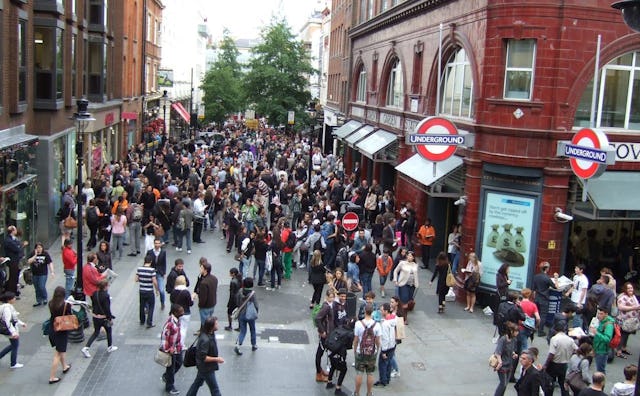Black Friday in the U.K.

So it was Black Friday last week. I mean, this isn’t news to you Americans. You invented it. It happens in your country, so we are led to believe, every year, so that when someone in the US says, “Hey, guys, it’s Black Friday this week,” everyone else will know what they’re talking about.
In Britain, however, Black Friday is unheard of—or at least it was, until about Wednesday last week. Then, all of a sudden, it was every-bloody-where, like “Blurred Lines” was, that summer everyone decided to like “Blurred Lines,” the idiots. Worse, everyone was talking about Black Friday without feeling the need to explain what it was. Seriously, you had to guess. It was as if explaining the venerable 24-hour-old Great British tradition of “Black Friday” would be in some way culturally insensitive. Either way, it was weird. Suddenly, everyone was talking about it, and you didn’t know what it was. It was like falling asleep in 1954 and waking up in 1956, and finding yourself the only person on Earth who didn’t know what this Elvis business was all about.
Worse still, people weren’t just talking about it, they were asking what you planned to do on it. It was like the whole country had been converted overnight to a weird religion that you were not part of, like Pagan tree-worship, for instance, and everyone was suddenly not only celebrating the Feast of Beltane or the Winter Solstice Horn Dance, but asking which antlers you planned to wear. (Which would actually make more sense, as the Winter Solstice Horn Dance really is an ancient British tradition. Unlike Black Friday, which isn’t.)
And so, people who, not a day earlier, had been blissfully ignorant of Black Friday, were now discussing tactics to get through it, as it was definitely going to happen. Somebody—nobody was quite sure who, whether it was the President, the Prime Minister, or the Illuminati—had decided that Black Friday was now A Thing in the UK. And so it was.
My annoyance at the readiness with which everyone had taken to “Black Friday” was only surpassed by my annoyance at finally discovering what it was. The name, it turns out, has nothing to do with what happens on the day itself. Whatsoever. The name “Black Friday” is evocative, mysterious. It sounds like it could, or should, be any of the following:
a) A communist holiday brought about by the brave actions of a revolutionary cell, the “Black Friday,” who died protecting Lenin during the 1917 Revolution;
b) A pirate vessel that vanished off the Azores in 1790, leaving no trace. Every year, the families of the Black Friday mariners light candles in their memory;
c) A colossal stock market crash following a jazz-age zeppelin disaster of titanic proportions.
Any of those would make sense, yes? But no. It turns out Black Friday is about shopping. It transpires that on Black Friday, there are some discounts, and so the shops see more shopping than is usual. That’s why it’s earned the nickname “The Onyx-Dark Equinox of Unredeemed Souls.” Sorry, is that name not melodramatic enough? No? Okay, then, how about “Black Friday”?
And so, as so often happens, the madness of crowds prevailed, and Black Friday joined The Black Eyed Peas, gang culture, the films of Rob Schneider, and the phrase “You Guys” in the big folder marked “Things We Didn’t Want From You Guys but Got Anyway.”
And, lo, it came to pass that the peoples of the Isle of Britain had their first Black Friday. And, although we were obeying the script of a drama we only dimly understood, it was chaos. There were crowds. Police were called. There were arrests. People fought over shiny consumer goods. “A woman was hit by a falling television,” according to the BBC website, which is bad news for her, obviously, but at least means that the universal force of gravity was largely unaffected by the sheer insanity of Black Friday. At the end of it, however, the Realm of Albion had not sunk into the sea, and the Mighty Gods appeared appeased, so we must have performed the ritual correctly.
So now, for no apparent reason, we have a new tradition. It may be just over a week old, but I believe it’s firmly taken root. Shops got so much business, and newspapers so much mileage, out of the phenomenon that I think it’s a dead cert for next year. And the year after. And the year after. Thanks, America. No really, thanks.
So while we’re at this cultural exchange thing, I think we should send a holiday tradition from the UK to you. Just to say thanks for our first Black Friday. But which one? Hm. Let me see. Dusting off my Big Book of Obscure British Folklore, I pass over the Winter Solstice Horn Dance to arrive instead at the Welsh tradition of the Mari Lwyd. No, I don’t know how to pronounce it either, but here’s what it is: every New Year’s Eve in parts of Gwent and Glamorgan, a local man hefts a horse’s skull on a pole. The skull has a spring-loaded jaw that clacks open and shut, very much as it would in a nightmare. The skull’s operator is then covered with a sheet and decked with ribbons, so it looks as if this Abomination Unto The Lord has somehow achieved independent life. People then take the Mari Lwyd (still no idea) from house to house, wishing the townspeople good luck in the coming year and almost certainly scaring the living crap out of them as a side effect.
Have YOU got your Horse Skull yet? Come on! There’s less than three weeks to go!
Good Lwydying, America!
This article was originally published on